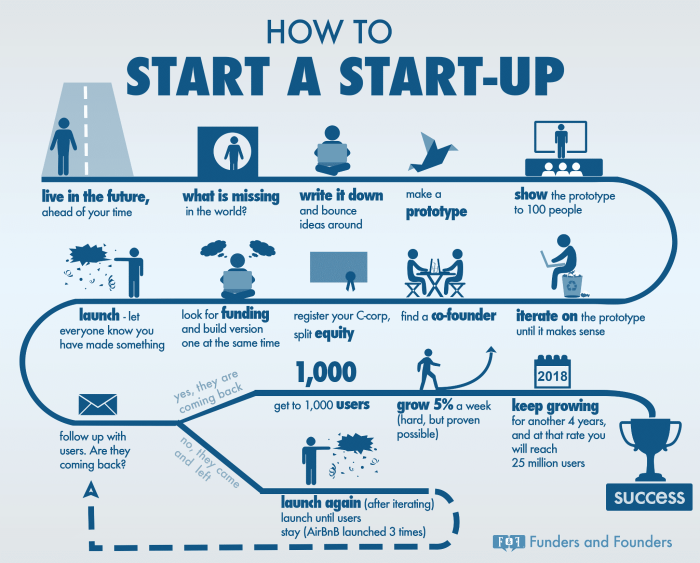Building a Startup Business sets the stage for entrepreneurial success, diving into key strategies and tactics for turning ideas into thriving ventures. Get ready to explore the exciting world of startups and unleash your business potential.
Researching the Market

Market research is like the secret sauce for a startup – you gotta have it before you can cook up success! It’s all about understanding your customers, competition, and trends to make informed decisions.
Methods for Conducting Market Research Effectively
- Surveys: Get direct feedback from potential customers to understand their needs and preferences.
- Interviews: Have one-on-one conversations to dive deeper into customer pain points and motivations.
- Competitor Analysis: Study what others in your industry are doing well and where they fall short.
- Online Research: Utilize tools like Google Trends, social media analytics, and industry reports to gather data.
Key Factors to Consider When Analyzing Market Trends
- Demographics: Understand the characteristics of your target market, such as age, gender, income, and location.
- Economic Conditions: Keep an eye on factors like GDP, inflation, and unemployment rates that can impact consumer behavior.
- Technological Advancements: Stay updated on new technologies that could disrupt your industry or create opportunities for innovation.
- Social Trends: Pay attention to cultural shifts, lifestyle changes, and emerging preferences that may influence market demand.
Developing a Business Plan
When it comes to starting a new business, having a comprehensive business plan is crucial for success. A well-thought-out plan not only helps you stay focused on your goals but also serves as a roadmap for your business’s future growth and development.
Components of a Comprehensive Business Plan
- Executive Summary: A concise overview of your business, including your mission statement and goals.
- Company Description: Detailed information about your business, its structure, and the problem it aims to solve.
- Market Analysis: Research on your target market, competitors, and industry trends.
- Organization and Management: Details about your team, organizational structure, and key roles.
- Product or Service Line: Description of what you offer and how it meets the needs of your target market.
- Marketing and Sales Strategy: Plans for promoting your business and acquiring customers.
- Financial Projections: Budgets, forecasts, and financial statements to show the viability of your business.
- Funding Request: If you need funding, Artikel how much you need and how you plan to use it.
Importance of Setting Clear Goals and Objectives
It’s essential to set clear and measurable goals in your business plan to provide direction and focus for your efforts. Clear goals help you track progress, make informed decisions, and stay motivated throughout the journey of building your startup.
Examples of Successful Business Plans
1. Airbnb: Their business plan focused on disrupting the hospitality industry by offering a platform for people to rent out their homes to travelers, emphasizing a unique and personalized travel experience.
2. Uber: Uber’s business plan revolutionized the transportation industry by introducing a convenient and efficient ride-sharing service through a mobile app, targeting urban commuters looking for affordable and reliable transportation options.
3. Amazon: Amazon’s business plan centered around becoming the world’s largest online retailer, offering a wide range of products, fast delivery, and exceptional customer service to dominate the e-commerce market.
Building a Strong Team
Building a strong team is crucial for the success of a startup business. A diverse and skilled team can bring a variety of perspectives, ideas, and expertise to the table, helping the company navigate challenges and capitalize on opportunities.
Significance of a Diverse and Skilled Team
Having a diverse team allows for a range of experiences and backgrounds to contribute to decision-making and problem-solving. This diversity can lead to more innovative solutions and better outcomes for the business. Additionally, a team with a mix of skills and expertise can cover all necessary areas of the business, from marketing to finance to operations.
Recruiting and Retaining Top Talent
- Offer competitive salaries and benefits to attract top talent.
- Provide opportunities for growth and development within the company.
- Cultivate a positive company culture that values and supports employees.
- Utilize employee referral programs to tap into existing networks for recruitment.
Role of Leadership and Teamwork
Effective leadership is essential for guiding the team towards the company’s goals and maintaining morale and motivation. A strong leader can inspire and empower team members to do their best work. Teamwork is also crucial, as collaboration and communication among team members can lead to more efficient problem-solving and decision-making.
Securing Funding: Building A Startup Business
Securing funding is a crucial step in building a successful startup. Without adequate capital, it can be challenging to grow and scale your business. There are various sources of funding available for startups, each with its pros and cons. Whether you choose to bootstrap or seek external investors, it’s essential to have a solid plan in place.
Different Sources of Funding
- Bootstrapping: Using personal savings or revenue generated by the business to fund operations. Pros: Maintains full control over the business, no need to give up equity. Cons: Limited resources, slower growth potential.
- Angel Investors: High-net-worth individuals who provide funding in exchange for equity. Pros: Access to expertise and connections. Cons: Loss of control, potential conflicts of interest.
- Venture Capital: Investment firms that provide funding in exchange for equity. Pros: Larger investment amounts, access to networks. Cons: Loss of control, pressure to scale quickly.
- Crowdfunding: Raising funds from a large number of people online. Pros: Access to a wide pool of investors, validation of product idea. Cons: Time-consuming, requires a strong marketing campaign.
Bootstrapping vs. Seeking External Investors
- Bootstrapping: Pros include maintaining control and flexibility, but cons involve limited resources and slower growth potential.
- Seeking External Investors: Pros include access to expertise and larger investment amounts, but cons involve loss of control and pressure to scale quickly.
Creating a Compelling Pitch Deck, Building a Startup Business
To attract investors, a compelling pitch deck is essential. Include key information such as:
- A clear problem statement and solution your business offers.
- Your unique value proposition and competitive advantage.
- Your target market and customer segments.
- Your business model and revenue streams.
- Your team’s expertise and background.
- Your financial projections and funding requirements.
Remember to keep your pitch deck concise, visually appealing, and focused on the most critical aspects of your business. A well-crafted pitch deck can make a significant difference in attracting the right investors to support your startup.
Creating a Marketing Strategy

Developing an effective marketing strategy is crucial for the success of a startup. It involves identifying target customers, understanding their needs, and positioning your product or service in a way that resonates with them.
Significance of Branding and Positioning
Branding and positioning play a key role in marketing a new business. A strong brand helps differentiate your startup from competitors and creates a lasting impression on customers. Positioning, on the other hand, involves how you want your target market to perceive your product or service in relation to others in the industry.
- Branding helps build trust and credibility with customers.
- Positioning allows you to highlight the unique value proposition of your startup.
- Both branding and positioning influence customer perception and purchasing decisions.
Examples of Innovative Marketing Campaigns
Innovative marketing campaigns can help startups gain traction and stand out in a crowded market. Some examples include:
-
Airbnb’s “Live There” campaign focused on the unique experiences travelers could have by staying in local homes, rather than traditional hotels.
-
Dollar Shave Club’s viral video showcasing their affordable razors and subscription service helped them quickly grow a loyal customer base.
-
Slack’s growth through word-of-mouth marketing and targeted advertising to tech-savvy professionals demonstrated the power of understanding your target audience.